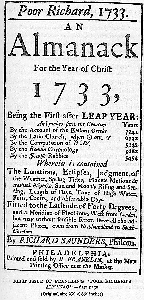provision was made for keeping them clean. The invention of an open stove, still used and known as the Franklin stove, he gave freely to the public, refusing to accept a patent therefore, when one was offered him by the governor.
Such a record speaks eloquently not only of Franklin's sagacity, but also of his genuine benevolence. Although it was his policy to keep his own personality in the background, it is no wonder that his services were recognized, and that he was now regarded as the leading citizen in Philadelphia. He was able to retire from active business in 1748, and was henceforward wholly employed in matters of public welfare. Since 1737, he had been postmaster of Philadelphia. In 1750, he was elected a member of the General Assembly.
A Man of Letters.
We have already noted the modest beginnings of Franklin's literary work in the contributions made anonymously, while an apprentice, to his brother's paper in Boston. These articles, signed with the pen-name Silence Dogood, inspired by Cotton Mather's Essays to do Good, and formed on the style of Addison, were merely experimental. The Busy Body papers, contributed to the Philadelphia Mercury in 1728-29, are not notable except for their well-developed sense of humor. But in 1732, Franklin published the first issue of his famous Almanac, which for a quarter of a century appeared annually, exercising no small influence on habits and morals throughout the colonies.
The Almanac.
To appreciate the popularity of Franklin's annual, it is necessary to recall the lack of original literature in America at that time. Among the common people, except the Bible, the printed sermons of the New England clergy, and their theological pamphlets, there was little if any reading matter of any sort. The almanac, however, was an established and cherished institution. It was as universal as the Bible itself. Various printers issued almanacs; peddlers carried them about in their packs; one hung in every chimney- corner. Their owners used them as receptacles for their memoranda and accounts. Such crude paragraphs and wise saws as might be found inserted among the calculations supplied about everything in the way of "profane" literature which was accessible to the people at large. No less than seven of these annual publications were appearing regularly in Philadelphia when Franklin's first issue appeared. Their predictions were vague and unsatisfying. "Rain here or in South Carolina," said one; "cold to the northward, warm to the southward," it declared. The editors, however, prided themselves on the fact that if they missed the mark in their weather forecasts, they were usually correct in placing the day of the week on its proper date in the month -- and that, after all, was the most useful thing in an almanac.
"Poor Richard."
The new publication, "by Richard Saunders, Philomath," was different from its predecessors. Franklin
created a character, Poor Richard, in whose name the work appeared, and whose real existence was
debated humorously and seriously. Scattered among the calculations, were many crisp sayings introduced
by the phrase "As Poor Richard says," -- sayings which have taken their place among the maxims of the
world. 
"Keep thy shop, and thy shop will keep thee."
"One today is worth two tomorrows."
"Plow deep while sluggards sleep."
"An empty sack cannot stand upright."
"Fools make feasts and wise men eat them."
"He that by the plow would thrive
Himself must either hold or drive."
These and scores of similar homely proverbs were incorporated in the Almanac. It was Franklin's idea to teach lessons of thrift to his countrymen. Some of the sayings he coined entire, others he quoted from various sources. They were finally sifted and collected in permanent form in a lengthy discourse called Father Abraham's Speech, which was included in the Almanac of 1758 and found its way thus into well-nigh every home in America. Father Abraham's Speech was translated into every European
| Previous chapter/page | Back | Home | Email this | Search | Discuss | Bookmark | Next chapter/page |
See our FAQ for more details.